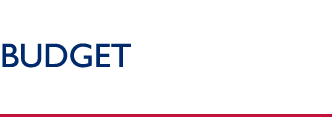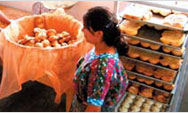 |
|
 |
 |
|
 |
 |
 |
USAID Information:
External Links:
|
|
 |
 |
|
Bolivia
The Development Challenge: Through January 2003, Bolivia experienced two decades of relative political and economic stability, including 21 uninterrupted years of democracy and 17 years of far-reaching and fundamental reforms in fiscal management, human rights, and democratic decentralization. Since January 2003, Bolivia has been confronted with serious social and political instability, including two periods of severe social unrest and violence that have left dozens dead. This turmoil has resulted in millions of dollars in property damage and forced the resignation of President Gonzalo Sanchez de Lozada, which has put the national government on the political defensive regarding a broad range of national policies. This threatens key initiatives that address major U.S. foreign policy objectives emphasizing support for Bolivian democracy and counter-narcotics efforts. Radical opposition groups, emboldened by their success in ousting President Lozada, are calling for severe restrictions on trade and investment, easing or elimination of restrictions on all coca cultivation, and an overhaul of the national constitution.
 |
|
Please note: All documents are in pdf format |
With a new President and cabinet in place, USAID is closely supporting peaceful and positive resolution of conflicts through its regular assistance program, continuous policy dialogue with the Government of Bolivia, and a special series of carefully targeted activities in specific areas. Much of Bolivia's political and social conflict is rooted in the deep and widespread poverty and social exclusion of the indigenous majority, inequitable economic growth, over-reliance on price-volatile exports, lack of state presence in most rural and some urban areas, government corruption and administrative incompetence, and a weak and under-capitalized private sector.
Though significant progress has been made over the last 20 years, high levels of poverty and social exclusion remain. Currently, about 58% of the Bolivian population live in poverty, and 24% live in extreme poverty. Rural poverty remains over 80%. Economic growth and job creation are lagging, due to limited financial services, poor productive infrastructure, lack of access to technology and markets, and low levels of education. A worldwide economic downturn, coupled with economic crises in neighboring Argentina and Brazil, has exacerbated Bolivia's economic problems. The crisis and its attendant problems are becoming a threat to the consolidation of Bolivia's democracy and economic stability. Despite important progress in social indicators, Bolivia still has the second highest level of infant, child, and maternal mortality in the hemisphere. Land tenure is becoming the most contentious issue in rural areas, occasionally leading to deadly violence. Illegal coca replanting is a constant threat to the successful implementation of Bolivia's anti-narcotics strategy. These issues require close and continuous attention to avoid the failure of the Bolivian state.
The Government of Bolivia and USAID have a strong and positive partnership. The Government of Bolivia remains committed to the objectives of USAID's collaboratively developed strategy; however, the Government's political weakness and severe fiscal crisis impede its ability to fully meet its commitments. The private sector has also been significantly debilitated by the recession and its own structural weaknesses.
The USAID Program: The Data Sheets provided below cover the six strategic objectives for which USAID is requesting FY 2004 and FY 2005 funds. These objectives are designed to advance key U.S. Government foreign policy objectives regarding Bolivia and the requirements of Bolivia as represented in its government policy agenda, including the Poverty Reduction Strategy Paper. The objectives focus on: improving the responsiveness and transparency of national and local governance and the justice system; increasing economic opportunities for poor rural populations through business development, trade, and improved agricultural productivity; improving health practices and the quality of, and access to, health services; sustainably managing natural resources and biodiversity; promoting licit income alternatives for rural farm families to reduce excess coca production; and providing budget support for the payment of multilateral debt held by the Bolivian Government. USAID is adjusting its current program to help address, in an expedited manner, the causes of the recent violent conflict. Changes include increased focus on the indigenous population especially in conflict-prone geographic areas, such as the city of El Alto, and measures to increase the State's presence in previously underserved rural and urban areas.
"State presence" in this context refers to the presence of the government as a legal authority and arbiter; service provider (including health, education, and basic infrastructure); and maintainer of law and order. The effective absence of the State in many areas is a leading contributor to the underdevelopment, poverty, and disorder that prevails there. USAID will also fund a series of targeted high-impact activities addressing urgent economic and social service needs in conflictive areas.
Other Program Elements: USAID's Office of Private and Voluntary Cooperation supports ongoing child survival projects implemented by three U.S. private and voluntary organizations (PVOs) under the Democracy, Conflict and Humanitarian Assistance Bureau (DCHA). All projects are in under-served rural areas of Bolivia where child health is at greatest risk. Also DCHA funds a political party training activity. Under the Economic Growth, Trade, and Agriculture (EGAT) Bureau, various grants support U.S. non-governmental organizations to expand financial services in Bolivia as well as a Farmer-to-Farmer program. EGAT also funds an adult literacy program and is helping to support the 2003 Demographic and Health Survey. The Centers for Excellence in Teacher Training, managed by the Latin America and Caribbean Bureau's Office of Regional Sustainable Development (LAC/RSD), provides teacher training. USAID also funds vocational education aimed at increasing the employability of poor youth through skills training. LAC/RSD also manages a grant to help fight trafficking in persons in Bolivia. The Global Development Alliance (GDA) Office supports ongoing efforts in the forestry sector through the Bolivian Chamber of Forestry that was matched by the Chamber itself, Fundación PUMA and the Swedish Development Agency. A new GDA activity will increase cocoa production in partnership with the U.S. chocolate industry. USAID is also exploring a potential partnership with a local natural gas producer/distributor which will supply funding for the establishment of a permanent agricultural research and extension service in the Chapare. Finally, as part of USAID's South America Regional program, trade capacity building and malaria control activities are implemented in Bolivia.
Other Donors: Donor coordination is strong in Bolivia, with the participation of eight multilateral and 15 bilateral donors. Thirteen of the bilateral donors are DAC (Paris Club/Consultative Group) members. Principal areas of donor interest are health, education, democracy and poverty reduction. The United States and Japan are the largest bilateral donors, and collaborate in the health sector through the Common Agenda. Multilateral donors include the U.N. agencies, the World Bank, the Inter-American Development Bank and the European Union. The donors' assistance is organized around the Bolivian Poverty Reduction Strategy Paper and the GOB's Plan of Action. USAID plays an active role in donor coordination and will continue to take a leadership position in the Alternative Development Donor Group. Spain, the United Nations Drug Control Program, and the European Union are active members of this group.
Back to Top ^
|


